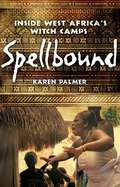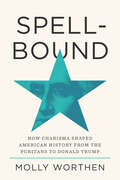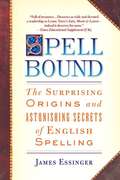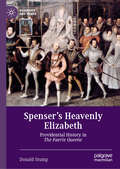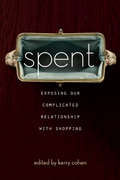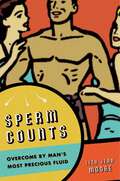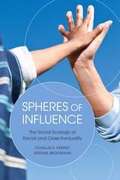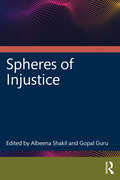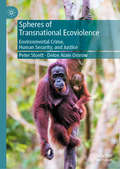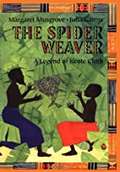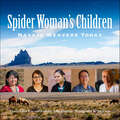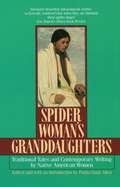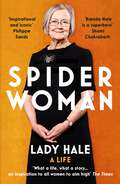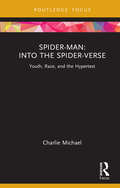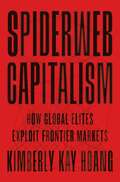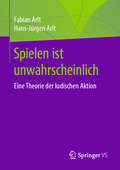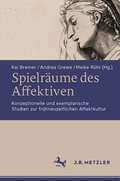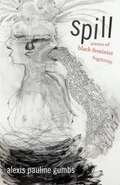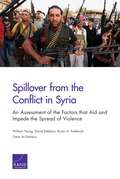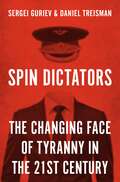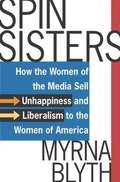- Table View
- List View
Spellbound
by Karen PalmerAs I attempted to digest stories of spiritual cannibalism, of curses that could cost a student her eyesight or ignite the pages of the books she read, I knew I was not alone in my skepticism. And yet, when I caught sight of the waving arms of an industrious scarecrow, the hair on the back of my neck would stand on end. It was most palpable at night, this creepy feeling, when the moon stayed low to the horizon and the dust kicked up in the breeze, reaching out and pulling back with ghostly fingers. There was something to this place that could be felt but not seen. With these words, Karen Palmer takes us inside one of West Africa's witch camps, where hundreds of banished women struggle to survive under the watchful eye of a powerful wizard. Palmer arrived at the Gambaga witch camp with an outsider's sense of outrage, believing it was little more than a dumping ground for difficult women. Soon, however, she encountered stories she could not explain: a woman who confessed she'd attacked a girl given to her as a sacrifice; another one desperately trying to rid herself of the witchcraft she believed helped her kill dozens of people. In Spellbound, Palmer brilliantly recounts the kaleidoscope of experiences that greeted her in the remote witch camps of northern Ghana, where more than 3,000 exiled women and men live in extreme poverty, many sentenced in a ceremony hinging on the death throes of a sacrificed chicken. As she ventured deeper into Ghana's grasslands, Palmer found herself swinging between belief and disbelief. She was shown books that caught on fire for no reason and met diviners who accurately predicted the future. From the schoolteacher who believed Africa should use the power of its witches to gain wealth and prestige to the social worker who championed the rights of accused witches but also took his wife to a witch doctor, Palmer takes readers deep inside a shadowy layer of rural African society. As the sheen of the exotic wore off, Palmer saw the camp for what it was: a hidden colony of women forced to rely on food scraps from the weekly market. She witnessed the way witchcraft preyed on people's fears and resentments. Witchcraft could be a comfort in times of distress, a way of explaining a crippling drought or the inexplicable loss of a child. It was a means of predicting the unpredictable and controlling the uncontrollable. But witchcraft was also a tool for social control. In this vivid, startling work of first-person reportage, Palmer sheds light on the plight of women in a rarely seen corner of the world.
Spellbound: How Charisma Shaped American History from the Puritans to Donald Trump
by Molly WorthenWhat happens when Americans lose faith in their religious institutions—and politicians fill the void? From the Puritans to Donald Trump, this sweeping history will change your understanding of the forces that create leaders and hold their followers captive.&“Elegant and insightful, Spellbound is an important contribution to the urgent project of understanding America in our time.&”—Jon MeachamEveryone feels it. Cultural and political life in America has become unrecognizable and strange. Firebrands and would-be sages have taken the place of reasonable and responsible leaders. Nuanced debates have given way to the smug confidence of yard signs. How did we get here?In Spellbound, historian Molly Worthen argues that we will understand our present moment if we learn the story of charisma in America. From the Puritans and Andrew Jackson to Black nationalists and Donald Trump, the saga of American charisma, Worthen argues, stars figures who possess a dangerous and alluring power to move crowds. They invite followers into a cosmic drama where hopes are fulfilled and grievances are put right—and these charismatic leaders insist that they alone plot the way.The story of charisma in America reveals that when traditional religious institutions fail to deliver on their promise of a meaningful life, people will get their spiritual needs met in a warped cultural and political landscape dominated by those who appear to have the power to bring order and meaning out of chaos. Charismatic leaders address spiritual needs, offering an alternate reality where people have knowledge, power, and heroic status, whether as divinely chosen instruments of God or those who will restore national glory.Through Worthen&’s centuries-spanning historical research, Spellbound places a crucial religious lens on the cultural, economic, and political upheavals facing Americans today.
Spellbound: The Surprising Origins and Astonishing Secrets of English Spelling
by James EssingerFollowing the continued success of a wave of spelling and punctuation titles published in the past eighteen months, James Essinger's 'Spellbound' is an engagingly written, unique and comprehensive account of why the English language is riddled with words that are difficult to spell. Starting with an analysis of the first writing systems, via the origins of English spelling and how this has evolved, the book concludes with intriguing stories of how the spelling of many hard-to-spell words evolved.
Spenser’s Heavenly Elizabeth: Providential History in The Faerie Queene (Queenship and Power)
by Donald StumpThis book reveals the queen behind Edmund Spenser’s The Faerie Queene. Placing Spenser’s epic poem in the context of the tumultuous sixteenth century, Donald Stump offers a groundbreaking reading of the poem as an allegory of Elizabeth I’s life. By narrating the loves and wars of an Arthurian realm that mirrors Elizabethan England, Spenser explores the crises that shaped Elizabeth’s reign: her break with the pope to create a reformed English Church, her standoff with Mary, Queen of Scots, offensives against Irish rebels and Spanish troops, confrontations with assassins and foreign invaders, and the apocalyptic expectations of the English people in a time of national transformation. Brilliantly reconciling moral and historicist readings, this volume offers a major new interpretation of The Faerie Queene.
Spent behind the Wheel: Drivers' Labor in the Uber Economy
by Julietta Hua Kasturi RayExploring professional passenger driving and the gig economy through feminist theories of labor Are taxi drivers in today&’s era of the ride-hail app performing care work akin to domestic and household labor? So argue the authors of Spent behind the Wheel. Bringing together sociological and legal perspectives with feminist theoretical insights, Julietta Hua and Kasturi Ray examine the case study of contemporary professional passenger driving in the United States. On the one hand, they show, the rise of the gig economy has brought new attention to the industry of professional passenger driving. On the other hand, the vulnerabilities that professional drivers experience remain hidden. Drawing on interviews with drivers, labor organizers, and members of licensing commissions, as well as case law and other published resources, Hua and Ray argue that working for ride-hail companies like Uber and Lyft shares similarities with driving for taxi companies in the impact on driver lives. Lyft and Uber sell the idea of industry disruption, but in fact they entrench long-standing modes of extracting the reproductive labor of their drivers for the benefit of consumer lives. Reproductive labor—conventionally understood as feminized labor—is extracted, but masked, behind the masculinized, racialized bodies of drivers. Professional driving is thus best understood alongside domestic and other gendered service work as reproductive labors devalued and often demonetized to benefit the national economy. Spent behind the Wheel is a must for readers interested in critical studies of technological change and the gig economy, showing how drivers&’ capacities are drained for the benefit of riders, corporations, and the maintenance of the racial state.
Spent: Exposing Our Complicated Relationship with Shopping
by Kerry CohenIn Spent, editor Kerry Cohen opens the closet doors wide to tales of women's true relationships with shopping, from humorous stories of love/hate relationships with the mall to heartbreaking tales of overspending to fix relationships. With a contributor list that includes notable female writers like Emily Chenoweth, Ophira Eisenberg, Allison Amend, and Aryn Kyle, the essays each shine light on the particular impact shopping has on all of us.Whether they're cleaning out closets of loved ones, hiding a shoplifting habit, trying out extreme couponing, dividing up family possessions, or buying a brand-new car while in labor, the book's contributors vacillate between convincing themselves to spend and struggling not to. This illuminating anthology links the effects shopping has on our emotions - whether it fills us with guilt, happiness, resentment, or doubt - our self-worth, and our relationships with parents, grandparents, lovers, children, and friends.
Sperm Counts: Overcome by Man's Most Precious Fluid (Intersections #17)
by Lisa Jean Moore2007 Choice Outstanding Academic TitleWinner of the Passing the Torch Award from the Center for Lesbian and Gay StudiesIt has been called sperm, semen, seed, cum, jizz, spunk, gentlemen's relish, and splooge. But however the “tacky, opaque liquid that comes out of the penis” is described, the very act of defining “sperm” and “semen” depends on your point of view. For Lisa Jean Moore, how sperm comes to be known is based on who defines it (a scientist vs. a defense witness, for example), under what social circumstances it is found (a doctor’s office vs. a crime scene), and for what purposes it will be used (in vitro fertilization vs. DNA analysis). Examining semen historically, medically, and culturally, Sperm Counts is a penetrating exploration of its meaning and power.Using a “;follow that sperm” approach, Moore shows how representations of sperm and semen are always in flux, tracing their twisting journeys from male reproductive glands to headline news stories and presidential impeachment trials. Much like the fluid of semen itself can leak onto fabrics and into bodies, its meanings seep into our consciousness over time. Moore’s analytic lens yields intriguing observations of how sperm is “spent” and “reabsorbed” as it spurts, swims, and careens through penises, vaginas, test tubes, labs, families, cultures, and politics.Drawn from fifteen years of research, Sperm Counts examines historical and scientific documents, children's “facts of life” books, pornography, the Internet, forensic transcripts and sex worker narratives to explain how semen got so complicated. Among other things, understanding how we produce, represent, deploy and institutionalize semen-biomedically, socially and culturally-provides valuable new perspectives on the changing social position of men and the evolving meanings of masculinity. Ultimately, as Moore reveals, sperm is intimately involved in not only the physical reproduction of males and females, but in how we come to understand ourselves as men and women.
Spheres of Influence: The Social Ecology of Racial and Class Inequality
by Douglas S. Massey Stefanie BrodmannThe black-white divide has long haunted the United States as a driving force behind social inequality. Yet, the civil rights movement, the increase in immigration, and the restructuring of the economy in favor of the rich over the last several decades have begun to alter the contours of inequality. Spheres of Influence, co-authored by noted social scientists Douglas S. Massey and Stefanie Brodmann, presents a rigorous new study of the intersections of racial and class disparities today. Massey and Brodmann argue that despite the persistence of potent racial inequality, class effects are drastically transforming social stratification in America. This data-intensive volume examines the differences in access to material, symbolic, and emotional resources across major racial groups. The authors find that the effects of racial inequality are exacerbated by the class differences within racial groups. For example, when measuring family incomes solely according to race, Massey and Brodmann found that black families’ average income measured $28,400, compared to Hispanic families’ $35,200. But this gap was amplified significantly when class differences within each group were taken into account. With class factored in, inequality across blacks’ and Hispanics’ family incomes increased by a factor of almost four, with lower class black families earning an average income of only $9,300 compared to $97,000 for upper class Hispanics. Massey and Brodmann found similar interactions between class and racial effects on the distribution of symbolic resources, such as occupational status, and emotional resources, such as the presence of a biological father—across racial groups. Although there are racial differences in each group’s access to these resources, like income, these disparities are even more pronounced once class is factored in. The complex interactions between race and class are apparent in other social spheres, such as health and education. In looking at health disparities across groups, Massey and Brodmann observed no single class effect on the propensity to smoke cigarettes. Among whites, cigarette smoking declined with rising class standing, whereas among Hispanics it increased as class rose. Among Asians and blacks, there was no class difference at all. Similarly, the authors found no single effect of race alone on health: Health differences between whites, Asians, Hispanics, and blacks were small and non-significant in the upper class, but among those in the lower class, intergroup differences were pronounced. As Massey and Brodmann show, in the United States, a growing kaleidoscope of race-class interactions has replaced pure racial and class disadvantages. By advancing an ecological model of human development that considers the dynamics of race and class across multiple social spheres, Spheres of Influence sheds important light on the factors that are currently driving inequality today.
Spheres of Injustice
by Albeena Shakil and Gopal GuruThis book presents a comprehensive overview of modern conceptualizations of justice in India. It analyses how these concepts relate to traditional theories of justice – in Marx, Ambedkar, Gandhi and Rawls as well as social realities in India. The book critically analyses theories of justice in India from a theoretical and comparative framework. It brings together contributions by well-known scholars to explore a range of questions and dilemmas around justice which have been brought about by a widening disparity between the powerful and the marginalized. The volume engages with the inadequacies of tautological theories of justice and fairness which fall short of adequately articulating the institutionalized forms of injustices and inequality facing citizens in modern society. It also explores exceptions and deviations from transcendental and universalist assumptions of contemporary theories of justice and studies movements and expressions of dissent and alternative structures and paradigms of conceptualizing justice. This book will be useful for scholars and researchers of political theory, political sociology, political studies, sociology, social theory, post-colonial theory and exclusion studies.
Spheres of Transnational Ecoviolence: Environmental Crime, Human Security, and Justice
by Peter Stoett Delon Alain OmrowThis book explores violence against the environment within the broad scope of transnational environmental crime (TEC): its extent, perpetrators, and responses. TEC has become one of the greatest threats to environmental and human security today, as well as a lucrative enterprise and a mode of life in many regions of the world. Transnational Spheres of Ecoviolence argues that we cannot seriously consider stopping TEC without also promoting environmental (and climate) justice. The spheres covered range from wildlife and plant crime to illegal fisheries to toxic waste and climate crime. These acts of violence against the environment are both localized in terms of event and impact, and globalized in terms of market drivers and internationalized responses. Because it is so often intimately linked to political violence, coerced labor, economic and physical displacement, and development opportunity costs, ecoviolence must be viewed primarily as a human security issue; the fight against it must derive legitimacy from impacts on local communities, and be twinned wth the protection of environmental activists. Reliance on the generosity of distant corporations or the effectiveness of legal structures will not be adequate; and militarized responses may do more harm to human security than good to nature. A transformative approach to transnational ecoviolence is a very complex task affected by the geopolitics of neoliberalism, authoritarian states, rebel factions and extremists, socio-economic patterns, and many other factors. In this challenging text, the authors capture this complexity in digestible form and offer a wide-ranging discussion of commensurate policy recommendations for governments and the general public.
Spider Weaver: A Legend Of Kente Cloth
by Margaret MusgroveThe story of the weavers who were inspired by web of a spider and developed kente cloth.
Spider Woman's Children: Navajo Weavers Today
by Lynda Teller Pete Barbara Teller OrnelasNavajo rugs set the gold standard for handwoven textiles in the U.S. Their history and value to collectors is unparalleled. But what about the people who create these treasures? You might be surprised. Spider Woman's Children is the inside story, told by two women who are both deeply embedded in their own culture, and considered among the very most skillful and artistic of Navajo weavers today. Barbara Teller Ornelas and Lynda Teller Pete are fifth-generation weavers who grew up at the fabled Two Grey Hills trading post. Their family and clan connections give them rare insight into where the craft has been and where it is going. They take you into traditional hogans, remote trading posts, reservation housing neighborhoods, and urban apartments to meet weavers who follow the paths of their ancestors, who innovate with new designs and techniques, and who uphold time-honored standards of excellence. You'll meet men who learned to weave from their grandmothers; women who weave alongside their aging moms; a young woman who incorporates contemporary images into skillful, highly collectible tapestries. You'll walk with elderly women over their sheep pastures and cornfields in search of natural dyestuffs. You'll see how well made, simple weaving tools from generations past take a place of pride in every home. And throughout, you'll see examples of the finest, most mindful weaving this rich tradition has to offer.
Spider Woman's Granddaughters
by Paula Gunn AllenThese 24 compelling and bleakly evocative narratives compiled by Allen, a professor of Native American studies at the University of California, all stress the theme of loss: loss of identity, loss of culture, loss of personal meaning. By juxtaposing traditional stories with contemporary tales, Allen allows readers to see how the same themes, values and perceptions have endured through the centuries, "testaments to cultural persistence, to a vision and a spiritual reality that will not die." Echoes of the traditional "Oshkikwe's Baby," about an old witch who steals babies, can be found in two stories. In Louise Erdrich's "American Horse," a white social worker separates a boy from his mother for his own "good," to the anguish of mother and son.- Publishers Weekly
Spider Woman: A Life – by the former President of the Supreme Court
by Lady HaleLady Hale is an inspirational figure admired for her historic achievements and for the causes she has championed. Spider Woman is her story. As 'a little girl from a little school in a little village in North Yorkshire', she only went into the law because her headteacher told her she wasn't clever enough to study history. She became the most senior judge in the country but it was an unconventional path to the top. How does a self-professed 'girly swot' get ahead in a profession dominated by men? Was it a surprise that the perspectives of women and other disadvantaged groups had been overlooked, or that children's interests were marginalised? A lifelong smasher of glass-ceilings, who took as her motto 'women are equal to everything', her landmark rulings in areas including domestic violence, divorce, mental health and equality were her attempt to correct that. As President of the Supreme Court, Lady Hale won global attention in finding the 2019 prorogation of Parliament to be unlawful. Yet that dramatic moment was merely the pinnacle of a career throughout which she was hailed as a pioneering reformer. Wise, warm and inspiring, Spider Woman shows how the law shapes our world and supports us in crisis. It is the story of how Lady Hale found that she could overcome the odds, which shows that anyone from similar beginnings will find that they can cope too.
Spider and His Son Find Wisdom: An Akan Tale
by Melinda LillyWhile trying to gather up all the wisdom he thinks he has wasted on the villagers, Ananse the spider learns something new about himself.
Spider-Man: Youth, Race, and the Hypertext (Cinema and Youth Cultures)
by Charlie MichaelExploring the dynamic genres of animation and comic book films, this book examines the transmedia role of Spider-Man: Into the Spider-Verse (2018) and its critical involvement in attempts to diversify representations in youth-oriented cinema and culture.Several years after the movie’s immense commercial and critical success, a look back on the innovative features of Spider-Man: Into the Spider-Verse shows how the film’s force derives from its thoughtful depiction of Miles Morales – a young, Afro-Latino superhero who must face systemic obstacles his white predecessor nerver worried about. Engaging a web of pressing topics in the field – from transmedia storytelling to identity formation and minority representation – this book offers an accessible analysis of the hypertextual design and animation techniques, which help this film to sensitively confront the combustible dynamics of racial representation in contemporary American youth culture.Written in an approachable style, this book is suitable for undergraduates, postgraduates, and specialists in the field. It is a versatile resource for media studies, film studies, animation studies, and cultural studies courses, but will also appeal to fans seeking to investigate the thematic underbelly of Into the Spider-Verse.
Spiderweb Capitalism: How Global Elites Exploit Frontier Markets
by Kimberly Kay HoangA behind-the-scenes look at how the rich and powerful use offshore shell corporations to conceal their wealth and make themselves richerIn 2015, the anonymous leak of the Panama Papers brought to light millions of financial and legal documents exposing how the superrich hide their money using complex webs of offshore vehicles. Spiderweb Capitalism takes you inside this shadow economy, uncovering the mechanics behind the invisible, mundane networks of lawyers, accountants, company secretaries, and fixers who facilitate the illicit movement of wealth across borders and around the globe.Kimberly Kay Hoang traveled more than 350,000 miles and conducted hundreds of in-depth interviews with private wealth managers, fund managers, entrepreneurs, C-suite executives, bankers, auditors, and other financial professionals. She traces the flow of capital from offshore funds in places like the Cayman Islands, Samoa, and Panama to special-purpose vehicles and holding companies in Singapore and Hong Kong, and how it finds its way into risky markets onshore in Vietnam and Myanmar. Hoang reveals the strategies behind spiderweb capitalism and examines the moral dilemmas of making money in legal, financial, and political gray zones.Dazzlingly written, Spiderweb Capitalism sheds critical light on how global elites capitalize on risky frontier markets, and deepens our understanding of the paradoxical ways in which global economic growth is sustained through states where the line separating the legal from the corrupt is not always clear.
Spielen ist unwahrscheinlich: Eine Theorie der ludischen Aktion
by Hans-Jürgen Arlt Fabian ArltBegründet und entfaltet wird ein Begriff des Spiels, der sich um Lockungen und Drohungen des Unerwarteten dreht. Das Autorenduo ordnet seine Theorie der ludischen Aktion in klassische Konzepte des Spiels ein sowie in den aktuellen Diskurs der Game Studies. Die phänomenale Mannigfaltigkeit des Spiels wird in historischer Perspektive skizziert und in systematischer Weise gegliedert. Die Autoren erläutern medientechnische und kommunikative Voraussetzungen des Booms der Computerspiele und reflektieren die Diskussion über Eskalationen ludischer Gewalt. Kritisch ausgeleuchtet werden Instrumentalisierungen des Spiels, die sich unter dem Stichwort Gamification wachsender Beliebtheit erfreuen. Die auffällige Inflation der Spielmetapher wird in Zusammenhang gebracht mit ludischen Anmutungen in den sozialen Strukturen der modernen und digitalen Gesellschaft.Fabian Arlt, M. A., hat Medienmanagement studiert und promoviert im Studiengang Gesellschafts- und Wirtschaftskommunikation der Universität der Künste (UdK) in Berlin.Prof. Dr. Hans-Jürgen Arlt ist Sozialwissenschaftler und Publizist, er lehrt am Institut für Theorie und Praxis der Kommunikation der Universität der Künste (UdK) in Berlin.
Spielräume des Affektiven: Konzeptionelle und exemplarische Studien zur frühneuzeitlichen Affektkultur
by Kai Bremer Andrea Grewe Meike RühlDer Band eröffnet interdisziplinäre Zugriffe auf die Dynamik affektiver Normen und Normierungen in der Frühen Neuzeit. Welchen Normen war affektives Handeln unterworfen? Gab es geschlechterspezifische Unterschiede, die die Spielräume des Affektiven und die Möglichkeiten, diese zu verändern, prägten? Wie wurden diese Spielräume gesellschaftlich konnotiert und in den Künsten thematisiert? Diese und verwandte Fragen werden konzeptionell und exemplarisch mit Beiträgen aus Theologie, Philosophie, Literatur-, Musik-, Kunst- und Geschichtswissenschaft behandelt.
Spill: Scenes of Black Feminist Fugitivity
by Alexis Pauline GumbsIn Spill, self-described queer Black troublemaker and Black feminist love evangelist Alexis Pauline Gumbs presents a commanding collection of scenes depicting fugitive Black women and girls seeking freedom from gendered violence and racism. In this poetic work inspired by Hortense Spillers, Gumbs offers an alternative approach to Black feminist literary criticism, historiography, and the interactive practice of relating to the words of Black feminist thinkers. Gumbs not only speaks to the spiritual, bodily, and otherworldly experience of Black women but also allows readers to imagine new possibilities for poetry as a portal for understanding and deepening feminist theory.
Spilled Milk: Based On A True Story
by K. L. Randis"Randis later would testify at a criminal trial against her father, who was sentenced to prison for his crimes [of child abuse]. He was sentenced to up to 16 years in 2004. Her painful -- and ultimately triumphant -- story is recounted in Randis' first novel, "Spilled Milk." When social services jeopardize her safety, condemning her to keep her father's secret, it's a glass of spilled milk at the dinner table that forces her to speak about the cruelty she's been hiding. In her pursuit of safety and justice, Brooke battles a broken court system that pushes to keep her father in the home.
Spillover from the Conflict in Syria: An Assessment of the Factors that Aid and Impede the Spread of Violence
by William Young David Stebbins Bryan A. Frederick Omar Al-ShaheryAid flowing into Syria is intended to determine the outcome of the conflict between rebel factions and Damascus. Instead, it could perpetuate the civil war and ignite larger regional hostilities that could reshape the political geography of the Middle East. This report examines the main factors likely to contribute to or impede the spread of violence from civil war and insurgency in Syria, and then examines how they apply to neighboring states.
Spin Dictators: The Changing Face of Tyranny in the 21st Century
by Daniel Treisman Sergei GurievHow a new breed of dictators holds power by manipulating information and faking democracyHitler, Stalin, and Mao ruled through violence, fear, and ideology. But in recent decades a new breed of media-savvy strongmen has been redesigning authoritarian rule for a more sophisticated, globally connected world. In place of overt, mass repression, rulers such as Vladimir Putin, Recep Tayyip Erdogan, and Viktor Orbán control their citizens by distorting information and simulating democratic procedures. Like spin doctors in democracies, they spin the news to engineer support. Uncovering this new brand of authoritarianism, Sergei Guriev and Daniel Treisman explain the rise of such “spin dictators,” describing how they emerge and operate, the new threats they pose, and how democracies should respond.Spin Dictators traces how leaders such as Singapore’s Lee Kuan Yew and Peru’s Alberto Fujimori pioneered less violent, more covert, and more effective methods of monopolizing power. They cultivated an image of competence, concealed censorship, and used democratic institutions to undermine democracy, all while increasing international engagement for financial and reputational benefits. The book reveals why most of today’s authoritarians are spin dictators—and how they differ from the remaining “fear dictators” such as Kim Jong-un and Bashar al-Assad, as well as from masters of high-tech repression like Xi Jinping.Offering incisive portraits of today’s authoritarian leaders, Spin Dictators explains some of the great political puzzles of our time—from how dictators can survive in an age of growing modernity to the disturbing convergence and mutual sympathy between dictators and populists like Donald Trump.
Spin Dictators: The Changing Face of Tyranny in the 21st Century
by Daniel Treisman Sergei GurievHow a new breed of dictators holds power by manipulating information and faking democracyHitler, Stalin, and Mao ruled through violence, fear, and ideology. But in recent decades a new breed of media-savvy strongmen has been redesigning authoritarian rule for a more sophisticated, globally connected world. In place of overt, mass repression, rulers such as Vladimir Putin, Recep Tayyip Erdogan, and Viktor Orbán control their citizens by distorting information and simulating democratic procedures. Like spin doctors in democracies, they spin the news to engineer support. Uncovering this new brand of authoritarianism, Sergei Guriev and Daniel Treisman explain the rise of such “spin dictators,” describing how they emerge and operate, the new threats they pose, and how democracies should respond.Spin Dictators traces how leaders such as Singapore’s Lee Kuan Yew and Peru’s Alberto Fujimori pioneered less violent, more covert, and more effective methods of monopolizing power. They cultivated an image of competence, concealed censorship, and used democratic institutions to undermine democracy, all while increasing international engagement for financial and reputational benefits. The book reveals why most of today’s authoritarians are spin dictators—and how they differ from the remaining “fear dictators” such as Kim Jong-un and Bashar al-Assad, as well as from masters of high-tech repression like Xi Jinping.Offering incisive portraits of today’s authoritarian leaders, Spin Dictators explains some of the great political puzzles of our time—from how dictators can survive in an age of growing modernity to the disturbing convergence and mutual sympathy between dictators and populists like Donald Trump.
Spin Sisters: How the Women of the Media Sell Unhappiness and Liberalism to the Women of America
by Myrna BlythThe former editor of Lady's Home Journal and other woem's magazines takes a hard, thought-provoking look at how those magazines and the TV news magazines seek to promote a liberal political agenda while selling victimhood and unhappiness to American women. If you've ever wondered how the TV news magazines and women's magazines get those celebrity interviews, you need wonder no more. This book takes you to the dark side of the magazine business, and whether you're a woman who reads those magazines or just a media junky of either gender, you'll find this book fascinating.
